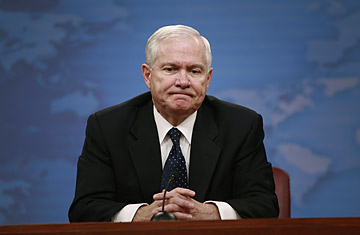
Secretary of Defense Robert Gates
The Pentagon's top brass are accustomed to having a shroud of secrecy pulled over the planning of military campaigns, but this year, it's the budget planning of their boss, Defense Secretary Robert Gates, that's been top secret. Gates has forced the military's high command to sign an oath pledging to keep mum about what they have learned of the Pentagon's 2010 budget, parts of which Gates is expected to unveil on Monday. That's because Gates hopes the element of surprise will increase his chance of getting what he wants: a shift in spending from billion-dollar Cold War–era weapons to the simpler armored vehicles and spy drones needed to win in places like Afghanistan and Iraq. You might even think of Gates' Monday afternoon press conference as the opening salvo in a third war, pitting himself and the Obama Administration against the entrenched interests in the services, the defense industry, and among those on Capitol Hill whose districts benefit from investment in big-ticket weapons systems.
Gates served as Defense Secretary for the final two years of the Bush Administration, where he was charged with straightening out the wars in Iraq and Afghanistan. Now he is turning his attention to restructuring the Pentagon's spending priorities, and the secrecy surrounding the budget planning has made some partisans nervous that some of the military's most prized programs may be on the chopping block. Their concern is justified, according to Gates' supporters, because the Defense Secretary is questioning the priority given to weapons optimized for the Cold War, which has been over for nearly a generation. While the Air Force may get 20 more of its top-of-the-line F-22 fighter, it already has 183 of the $350 million planes, not one of which has flown over either Afghanistan or Iraq. The biggest program the Army has under development — the Future Combat Systems — is a $160 billion fleet of ground vehicles and aircraft that is ideal for waging war against a powerfully armed nation state but of far less use for the kinds of counterinsurgency wars currently being waged. And the Navy's shipbuilding program, which has been shoddily run for years, is likely to take blows to its plans for carrier and destroyer fleets. (See the top 10 outrageous earmarks of 2008.)
"We have a tendency to like what we have," Admiral Mike Mullen, Chairman of the Joint Chiefs of Staff, told an audience last Thursday. "There's a momentum toward conventional warfare, despite the lessons that we're seeing right now" in waging irregular wars in Afghanistan and Iraq that should guide, among other things, "what kind of equipment we buy for the future."
Missile defense, which has cost the nation about $10 billion annually over the past decade, is also likely to be trimmed, and a new constellation of communications satellites may be curtailed, Defense officials predict. They say Gates hopes that much of the money thus freed up will be directed toward the more mundane elements of war-fighting — armored vehicles, pilotless drones and body armor for troops — which were in short supply for the first several years of the wars in Afghanistan and Iraq.
Gates has been saying for months that the time has come for a "strategic reshaping" of the way the U.S. military is spending $600 billion a year — a tab that doesn't even include the cost of the wars in Afghanistan and Iraq. Now he's going public with the 2010 budget proposal he drafted in secret before formally sending it to the White House and the Office of Management and Budget. It's a ploy designed to build momentum for Gates' plan before it can be sabotaged by defense contractors and lawmakers (who often come from districts that benefit from building particular big-ticket items), with behind-the-scenes help from the military.
"If even a few of the Gates cuts are serious, a pork-crazed Congress will go nuts," says Winslow Wheeler, who spent 30 years working on defense issues for members of both parties on Capitol Hill. "The big challenge will then become making any serious decisions stick."
Gates' aides say his budget is being presented as a single holistic proposal — rather than being leaked in dribs and drabs, which could build resistance to specific changes — and therefore it stands a better chance of winning approval from Congress. Resistance will be fierce on the Hill, where some view any retooling of the military budget as a recipe for a weaker America and others simply want to keep defense-contractor jobs in their districts — a combination that could yet trump a highly-regarded Defense Secretary and President. Obama, for his part, has sought to lead by example by making clear that he believes the Marines' plan to spend more than $13 billion on a new fleet of helicopters to transport the President is an unnecessary extravagance the nation can't afford. It remains to be seen whether Congress will follow suit.
